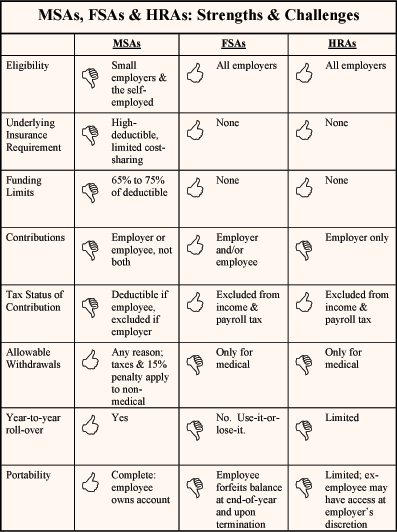America's health care system is an uneven playing field. Government subsidizes employer-provided health insurance by excluding the premiums from taxation. But if employers or employees set up a savings account for employees to purchase health care directly, those funds are fully taxed. This tax distortion can be quite large. When federal and state income taxes are combined with payroll taxes (FICA) , most middle-income families are in the 50 percent tax bracket. As a result, the tax collector confiscates up to half of any health care savings before they are even deposited in the account.
This distortion encourages employers and workers to give all of their health care dollars – and some measure of control over their medical decisions – to a third-party payer. In this way, federal tax policy subsidizes the health maintenance organization (HMO) form of health coverage.
There are three exceptions to the general rule: medical savings accounts (MSAs), flexible spending accounts (FSAs) and health reimbursement arrangements (HRAs). Each treats medical savings more like third-party health insurance. Each is a step toward empowering patients rather than health insurance bureaucracies. And each is a promising tool for leveling the playing field, provided policy-makers make it more widely available, more flexible, and more portable.
Medical Savings Accounts (MSAs).
Medical savings accounts are currently available as part of a federal pilot program. Employers can make tax-free deposits to these accounts so long as they are combined with high-deductible insurance. MSA holders who are prudent health care consumers get to keep the balance in their MSAs, which grows tax free (although non-medical withdrawals before retirement are subject to income taxes plus a 15 percent penalty).
To many people, health insurance is more attractive and more affordable when it can be combined with an MSA. This is one reason MSAs have enrolled so many previously uninsured people. The Internal Revenue Service (IRS) reports 73 percent of the 100,000 current MSA holders previously had no health insurance.
However, the existing MSA pilot program is temporary, makes MSAs available only to small business employees and the self-employed, requires purchase of a high-deductible insurance policy rather than more flexible coverage, prohibits full funding of the MSA, and prohibits joint employer-employee contributions to the MSA. To realize their full potential, MSAs must be made permanent, available to all individuals, and more flexible in terms of the deductible and contributions.
Flexible Spending Accounts (FSAs).
Flexible spending accounts likewise allow employees to set aside money tax-free for anticipated medical needs. FSAs are strong in areas where MSAs are weak – and vice versa (see table). Unlike MSAs, any employer may establish FSAs for their employees (nearly 20 million Americans currently have one). FSAs have no insurance requirement and no funding limits, and like 401(k) plans allow joint employer-employee contributions. However, FSAs may be used only for medical expenses, and employees forfeit any funds left in the FSA at year's end or when they leave their job. This use-it-or-lose-it rule encourages workers to spend in wasteful ways. FSAs would be more attractive to workers (and would come closer to leveling the playing field) if they were made portable from year to year, and from job to job.
Health Reimbursement Arrangements (HRAs).
The newest arrival in the health care marketplace is the HRA, the result of a recent IRS ruling. HRAs were made available to federal employees in 2003 through an American Postal Workers Union health plan. They are similar to FSAs, with important exceptions. Unlike FSAs, only employers may contribute to HRAs. On the other hand, at an employer's discretion, workers may roll-over unspent HRA balances from year to year and may have limited access to leftover balances after they leave a job. Although HRAs are more flexible than FSAs, in the long run they too are governed by a use-it-or-lose-it rule. The funds can be spent only on health care or insurance premiums and can never be withdrawn as cash.
Conclusion.
Americans need health care savings accounts that are fully portable and can be used with any health insurance plan. MSAs, FSAs, and HRAs can reach this goal from different directions if Congress and the administration make them more widely available, more flexible, and more portable.
Michael F. Cannon is director of government affairs at the National Center for Policy Analysis.